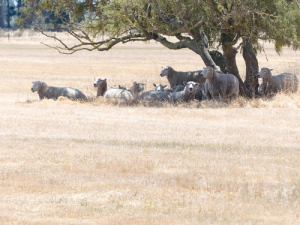Westpac expands community banking with new vans and extended branch hours
Westpac NZ has announced new initiatives that aim to give customers more options to do their banking in person.
 Long time between drinks: Sheep graze dry pasture a few kilometres west of Christchurch Airport in early December, on the day the airport weather station recorded its 46th consecutive day of no rain, bettering a record set in 1954.
Long time between drinks: Sheep graze dry pasture a few kilometres west of Christchurch Airport in early December, on the day the airport weather station recorded its 46th consecutive day of no rain, bettering a record set in 1954.
The threat of a big drought is prompting Westpac to contact its farmer clients to see what help they may need.
Andrew Hill, senior manager of risk and strategy for agribusiness, says the bank is talking to farmers and their families who are under stress, to see what the bank can do now to help them personally, and to buy extra feed if needed.
“We will be… asking what contingency plans they have made,” he told Rural News.
“We are starting to hear about people talking about once-a-day milking and starting to look after their better-performing cows to try to maintain production and make sure cows recently mated don’t lose their calves.”
Hill says farmers early-on have been using surplus cash to repay debt. But he acknowledges that with the likely lower dairy payout less cash will be around and farmers must manage this well.
Meanwhile, Agriculture Minister Damien O’Connor says the ongoing dry is forcing hard decisions on more farmers and horticulturalists. Recent rains were insufficient; MPI is watching this and regularly updating him.
“Government acknowledges we are facing climate change,” he says. “Now all primary sectors must build more resilient systems to deal with the changes in climate that we have experienced in the last few years.”
O’Connor says on his own patch, the West Coast, the lack of rain is challenging farmers.
This is backed up Rebecca Keoghan, who runs Landcorp farms on the West Coast and is a director of Westland Milk Products. She describes the situation as “hideous”.
“People are saying it’s a green drought, but we are actually in the midst of a brown drought now because there is no grass anywhere in the region. What little rain we have had won’t be enough to make a change. I suspect part of our season is lost; I don’t think we’ll recover from it unless we get a decent rain.”
Keoghan says Landcorp has been planning a drought strategy for about 18 months and is well prepared to cope. She says the Coast has gone from the wettest winter in 40 years to the driest summer in 40 years.
The World Wide Sires National All Day Breeds Best Youth Camp Best All Rounder plaudit has become family affair, with 2026 Paramount Cup winner Holly Williams following in her sister Zara's footsteps.
DairyNZ is giving New Zealand farmers a unique opportunity to gain hands-on governance and leadership experience within the dairy sector.
Herd improvement company LIC has posted a 5.2% lift in half-year revenue, thanks to increasing demand for genetics.
According to the latest Fresh Produce Trend Report from United Fresh, 2026 will be a year where fruit and vegetables are shaped by cost pressures, rapid digital adoption, and a renewed focus on wellbeing at home.
The Roar is a highlight of the game hunting calendar in New Zealand, with thousands of hunters set to head for the hills to hunt male stags during March and April.
OPINION: The past few weeks have been tough on farms across the North Island: floods and storms have caused damage and disruption to families and businesses.